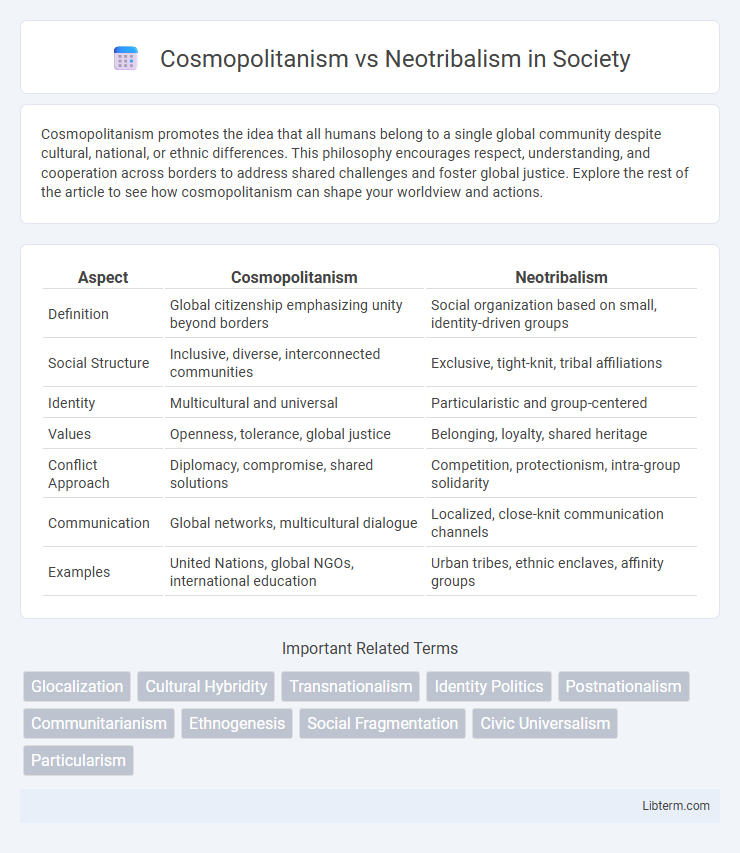Cosmopolitanism promotes the idea that all humans belong to a single global community despite cultural, national, or ethnic differences. This philosophy encourages respect, understanding, and cooperation across borders to address shared challenges and foster global justice. Explore the rest of the article to see how cosmopolitanism can shape your worldview and actions.
Table of Comparison
| Aspect | Cosmopolitanism | Neotribalism |
|---|---|---|
| Definition | Global citizenship emphasizing unity beyond borders | Social organization based on small, identity-driven groups |
| Social Structure | Inclusive, diverse, interconnected communities | Exclusive, tight-knit, tribal affiliations |
| Identity | Multicultural and universal | Particularistic and group-centered |
| Values | Openness, tolerance, global justice | Belonging, loyalty, shared heritage |
| Conflict Approach | Diplomacy, compromise, shared solutions | Competition, protectionism, intra-group solidarity |
| Communication | Global networks, multicultural dialogue | Localized, close-knit communication channels |
| Examples | United Nations, global NGOs, international education | Urban tribes, ethnic enclaves, affinity groups |
Defining Cosmopolitanism: Embracing Global Citizenship
Cosmopolitanism emphasizes the idea of global citizenship, advocating for an identity that transcends national and cultural boundaries to promote universal values such as human rights, justice, and equality. It supports interconnectedness and cooperation among diverse populations, encouraging individuals to see themselves as part of a larger global community. This worldview fosters inclusivity, cultural exchange, and the recognition of shared responsibilities beyond local or tribal affiliations.
Neotribalism Explained: The Rise of Modern Tribal Identities
Neotribalism refers to the resurgence of tribal-like social structures and identities in modern societies, emphasizing close-knit communities bound by shared values, culture, or interests rather than traditional nation-states. This phenomenon challenges cosmopolitan ideals by promoting localized loyalty and collective identity, often as a response to globalization and cultural homogenization. Modern neotribalism fosters social cohesion through rituals, symbols, and group narratives, creating fortified social networks that influence political behavior and cultural expression.
Historical Roots: Evolution of Cosmopolitan and Tribal Thought
Cosmopolitanism traces its roots to ancient Greek philosophy, particularly Stoicism, emphasizing universal citizenship and shared human values across borders. Neotribalism draws from anthropological insights into pre-modern tribal societies, highlighting identity, kinship, and localized social bonds as responses to modernity's fragmentation. Historical evolution reveals cosmopolitan ideals fostering global integration, while neotribalism resurges as a reaction to cultural homogenization and social alienation.
Core Values: Universalism vs. Particularism
Cosmopolitanism emphasizes universalism, advocating for global citizenship and shared human values that transcend cultural and national boundaries. Neotribalism prioritizes particularism, valuing distinct group identities, traditions, and localized loyalties over universal principles. This tension between core values defines the ideological divide where universal human rights confront culturally specific norms and social cohesion.
Social Cohesion: Integration or Fragmentation?
Cosmopolitanism promotes social cohesion through integration by emphasizing global citizenship, shared values, and inclusive identities that transcend local or ethnic boundaries. Neotribalism, conversely, encourages social fragmentation by reinforcing distinct group identities, loyalty to smaller communities, and cultural particularism, often leading to boundary-driven social dynamics. The tension between these paradigms affects societal unity, with cosmopolitanism fostering interconnectedness and neotribalism highlighting division.
Impact of Globalization: Connecting or Dividing Societies
Globalization accelerates the spread of cosmopolitan values by promoting cross-cultural exchange and interconnectedness, fostering a sense of global citizenship beyond national boundaries. Conversely, it also intensifies neotribalism as communities react to rapid changes with a reassertion of local identities and exclusive group affiliations. The dual impact of globalization simultaneously bridges diverse societies and amplifies divisions based on cultural, ethnic, or ideological lines.
Technology’s Role: Digital Cosmopolitans and Online Tribes
Digital cosmopolitans leverage technology to access diverse global cultures, fostering inclusive identities and cross-border collaboration through social media platforms and virtual communities. Online tribes, shaped by algorithms and niche interests, create tightly-knit groups that reinforce shared values and collective identities despite physical distances. Both phenomena demonstrate technology's dual capacity to unify broad cultural spectrums and deepen subgroup affiliations in the digital age.
Political Implications: Governance in a Divided World
Cosmopolitanism advocates for global governance frameworks emphasizing universal human rights and transnational cooperation to address complex challenges such as climate change and migration. In contrast, neotribalism promotes localized governance rooted in ethnic, cultural, or ideological identities, often resulting in fragmented political authority and increased intergroup conflict. This divergence complicates policymaking, as cosmopolitan institutions struggle to enforce norms across diverse tribes, while neotribalism undermines centralized power and international integration efforts.
Cultural Identity: Blending vs. Preserving Traditions
Cosmopolitanism emphasizes cultural identity through blending diverse traditions, fostering global interconnectedness and shared values beyond national or ethnic boundaries. Neotribalism prioritizes preserving distinct cultural identities by reinforcing traditional practices, symbols, and communal bonds within smaller, tightly-knit groups. This dynamic highlights the tension between global cultural integration and localized cultural preservation in contemporary identity formation.
Future Outlook: Harmony or Conflict Between Worldviews
The future outlook of cosmopolitanism versus neotribalism hinges on their competing values: universal inclusion versus localized identity, influencing global cooperation and social cohesion. Emerging trends in digital communication and migration patterns may either bridge these divides or deepen cultural fragmentation, impacting international relations and policy formation. Understanding the dynamic interplay between these worldviews is critical for fostering peace, economic integration, and sustainable development in an interconnected world.
Cosmopolitanism Infographic

 libterm.com
libterm.com